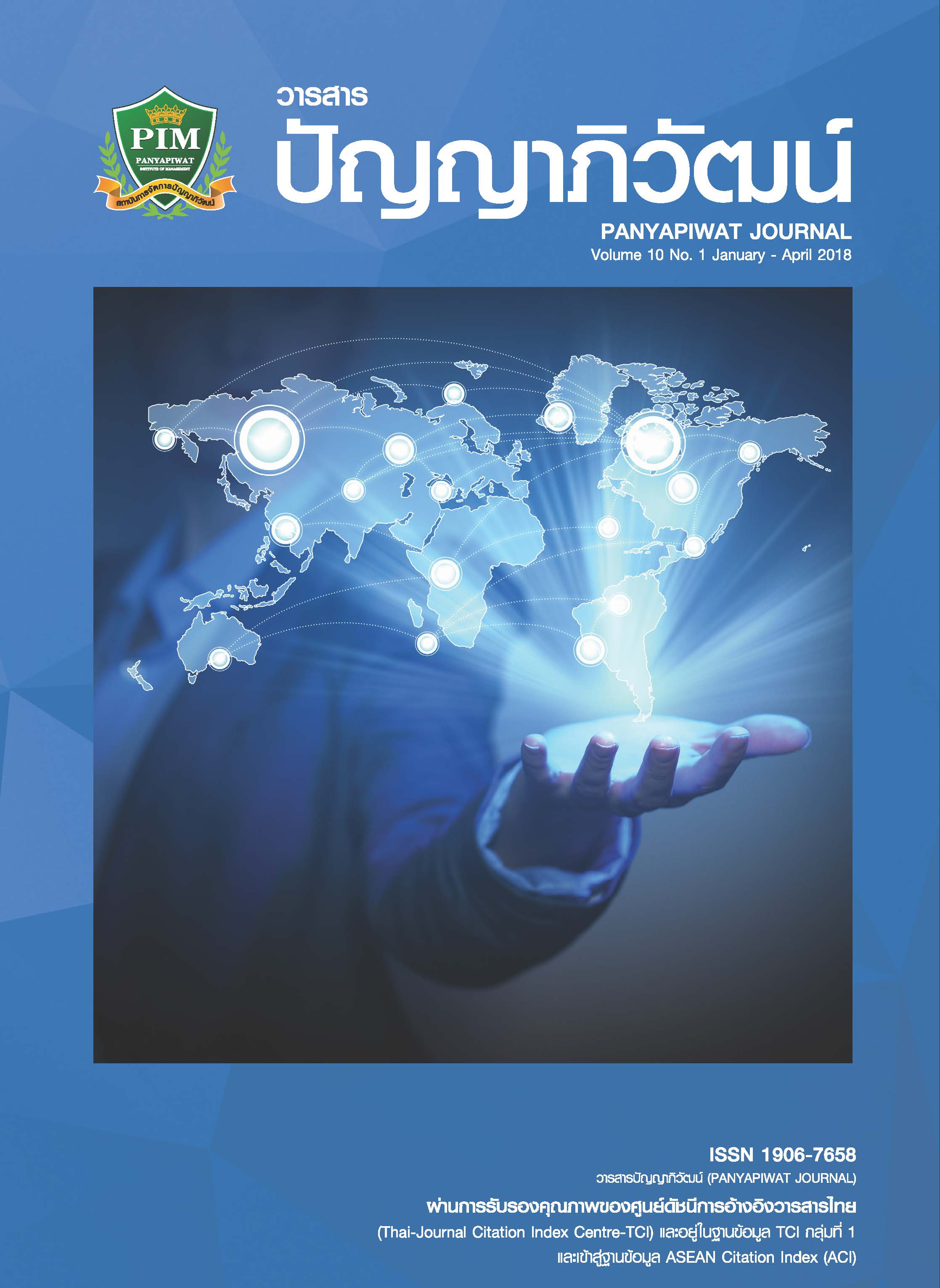ความสามารถในการพัฒนาตนเองที่มีผลต่อประสิทธิภาพการทำงาน ผ่านบุคลิกภาพแบบประนีประนอมของพนักงานมหาวิทยาลัยสายสนับสนุน
Main Article Content
บทคัดย่อ
งานวิจัยครั้งนี้มีวัตถุประสงค์ 1) เพื่อศึกษาอิทธิพลของความสามารถในการพัฒนาตนเองด้านทักษะและด้านการกระทำให้สำเร็จต่อประสิทธิภาพการทำงานของพนักงานมหาวิทยาลัยสายสนับสนุน 2) เพื่อศึกษาอิทธิพลของความสามารถในการพัฒนาตนเองด้านทักษะและด้านการกระทำให้สำเร็จต่อบุคลิกภาพของพนักงานมหาวิทยาลัยสายสนับสนุน 3) เพื่อศึกษาอิทธิพลของบุคลิกภาพแบบประนีประนอมต่อประสิทธิภาพการทำงานของพนักงานมหาวิทยาลัยสายสนับสนุน 4) เพื่อศึกษาอิทธิพลของความสามารถในการพัฒนาตนเองด้านทักษะและด้านการกระทำให้สำเร็จที่ส่งผลต่อประสิทธิภาพการทำงานของพนักงานมหาวิทยาลัยสายสนับสนุนผ่านบุคลิกภาพแบบประนีประนอม การวิจัยครั้งนี้ใช้ระเบียบวิธีวิจัยเชิงปริมาณ โดยใช้แบบสอบถามกับกลุ่มตัวอย่างคือ พนักงานมหาวิทยาลัยสายสนับสนุนงานบริการในมหาวิทยาลัยแห่งหนึ่ง จำนวนทั้งสิ้น 104 คน แล้วนำข้อมูลมาวิเคราะห์อิทธิพลของตัวแปรด้วยการถดถอยพหุคูณ จากผลการศึกษาพบว่า ความสามารถในการพัฒนาตนเองด้านทักษะ และด้านการกระทำให้สำเร็จมีอิทธิพลทางบวกกับประสิทธิภาพในการทำงาน และความสามารถในการพัฒนาตนเองด้านทักษะและด้านการกระทำให้สำเร็จมีอิทธิพลทางบวกกับบุคลิกภาพแบบประนีประนอม รวมถึงบุคลิกภาพแบบประนีประนอม มีอิทธิพลทางบวกกับประสิทธิภาพการทำงาน สำหรับการทดสอบตัวแปรขั้นกลางพบว่า การควบคุมบุคลิกภาพแบบประนีประนอมเป็นตัวแปรกลางที่มีอิทธิพลต่อความสามารถในการพัฒนาตนเองด้านทักษะและด้านการกระทำให้สำเร็จโดยสมบูรณ์ (Fully mediators)
The objectives of this research are: 1) to study on influence of self-development on skills and completion on work efficiency of university’s supporting; 2) to study on influence of self-development on skills and completion on personalities of university’s supporting; 3) to study on influence of agreeableness on work efficiency of university’s supporting; 4) to study on influence of elf-development on skills and completion on work efficiency of university’s supporting through agreeableness. This research was conducted in the form of quantitative research by providing some questionnaires to the sample group for responding consisted of 104 a university. The obtained data were analyzed on influences of variables by using multiple regressions supping. The results showed that self-development on skills and completion on work efficiency had positive influence on work efficiency and agreeableness. Simultaneously, agreeableness had positive influence on work efficiency. For mediator variables test, it was found that agreeableness control was the mediator variables influencing on self-development on skills and completion on work efficiency (fully mediators).
Article Details
“ข้าพเจ้าและผู้เขียนร่วม (ถ้ามี) ขอรับรองว่า บทความที่เสนอมานี้ยังไม่เคยได้รับการตีพิมพ์และไม่ได้อยู่ระหว่างกระบวนการพิจารณาลงตีพิมพ์ในวารสารหรือแหล่งเผยแพร่อื่นใด ข้าพเจ้าและผู้เขียนร่วมยอมรับหลักเกณฑ์การพิจารณาต้นฉบับ ทั้งยินยอมให้กองบรรณาธิการมีสิทธิ์พิจารณาและตรวจแก้ต้นฉบับได้ตามที่เห็นสมควร พร้อมนี้ขอมอบลิขสิทธิ์บทความที่ได้รับการตีพิมพ์ให้แก่สถาบันการจัดการปัญญาภิวัฒน์หากมีการฟ้องร้องเรื่องการละเมิดลิขสิทธิ์เกี่ยวกับภาพ กราฟ ข้อความส่วนใดส่วนหนึ่งและ/หรือข้อคิดเห็นที่ปรากฏในบทความข้าพเจ้าและผู้เขียนร่วมยินยอมรับผิดชอบแต่เพียงฝ่ายเดียว”
เอกสารอ้างอิง
Asanathong, T. (2010). The study of self-improvement needs in order to improve service quality, case study: Flight attendant. Master of Business Administration, Graduate School Bangkok University. [in Thai]
Boydell, T. (1985). Management self-development: A guide for managers, organizations and institution.
Switzerland: International Labour Organization.
Chaingam, J. (2005). The relationship between The Big Five and the team efficiency of automobile sales representative. Master of Arts Program in Industrial and Organizational Psychology in Humanities, King Mongkut's University of Technology North Bangkok. [in Thai]
Chotikunaset, P. (2001). The self-improvement needs in academic of secondary school government teacher under the Department of General Education in Seri Thai School Consortium. Master's Degree Thesis, Faculty of Education, Ramkhamhaeng University. [in Thai]
Churh, A. T. (1982). Sojourner adjustment Psychological Bulletin, 9(3), 540-572.
Chusanapanich, T. (2010). The relationship between personalities and career success in Medical supplies representatives, case study in MSD (Thailand) Ltd. Master of Business Administration, Bangkok University. [in Thai]
Costa, P. T. Jr. & McCrae, R. R. (1995). Domains and Facets: Hierarchical Personality Assessment Using the Revised NEO Personality Inventory. Journal of Personality Assessment, 64(1), 21-50.
Costa, P. T. Jr. & McCrae, R. R. (1992). Primary Traits of Eysenck's P-E-N System: Three and Five-Factor Solutions. Journal of Personality and Social Psychology, 62(2), 308-317.
Duangkaew, T. (2002). The relationship between personalities, learning atmosphere awareness, and self-improvement activities participation of the Practitioner level employees. Master of Science Program in Industrial and Organizational Psychology, Chiang Mai University. [in Thai]
Endoorasd, K. (2007). The factors that affect to the work efficiency of the employee of Grohe Siam Company Limited. Master's Degree, Burapha University. [in Thai]
Heinstrom, J. (2003). Five personality dimension and their influence on information behavior. Retrieved July 3, 2010, from https://www.information.net/ir/9-1/paper165.html
Kanchanawasi, S. (2012). Applied statistics for research (6th ed.). Bangkok: Chulalongkom University Press. [in Thai]
Kanchanawasi, S., Pitayanon, T. & Srisuko, D. (2008). Proper Research Statistic Selection (5th ed.). Bangkok: Chulalongkorn University Printing. [in Thai]
Kunthong, J. (2006). Personality of the employee of Bank of Ayudhya Public Company Limited head office. Master of Public Administration Program in General Management Graduate School of Public Administration, Burapha University. [in Thai]
Lomax, R. G. & Hahs, D. L. (1992). Statistical Concepts: A Second Course. UK: Routledge.
Mendenhall, M. & Odduo, G. (1985). The dimension of expatriate acculturation. Academy of Management Review, 10(4), 39-47.
Permphol, K. (2009). Efficiency development (3rd ed.). Bangkok: Rajabhat Institute Suan Dusit. [in Thai]
Petersen, E. & Plowman, E. G. (1989). Business Organization and Management. Illinois: Irwin.
Pratchayapruet, T. (1999). Organization Theory. Bangkok: Thai Wattana Panich. [in Thai]
Sabaiying, V. (1999). Goal Setting Factor Self-efficacy and the image the Effect on the Performance of Direct Suppliers. Doctor of Philosophy (Behavioral Sciences), Behavioral Science Research Institute. [in Thai]
Saentikarn, B. & Aphibanrat, S. (2013). The Perception and Adjustment of Bachelor of Business Administration Graduates for The Working Response to Asean Economic Community. The Degree Bachelor of Business Administration Program in General Business Management, Silpakorn University. [in Thai]
Sripan, P. (2012). The relationship between The Big Five and working effectiveness of the employees of TISCO Bank PLC. in Credit Control and Management field. Thesis of M.B.A (Management), Graduate School
Srinakharinwirot University. [in Thai]
Srisa-ard, B. (2013). Fundamental research (7th ed.). Bangkok: Chomromdek. [in Thai]
Stening, B. W. (1979). Problems of cross-cultural contact: a literature review. International Journal of Intercultural Relations, 3(4), 269-313.
Tanadrob, N. (2002). The factors that affect to the operation efficiency of the employee of State Railway of
Thailand. Master of Arts Thesis in Social Sciences for Development, Rajabhat Institute Bansomdejchaopraya. [in Thai]
The Royal Institute. (2015). The Royal Institute Dictionary 2015 edition. Bangkok: Aksorn Charoenthat. [in Thai]
Thotphongchai, V. (2006). Graduate Program in Human Resource Development. National Institute of Development Administration. [in Thai]
Wattanarangsan, P. (2015). Increasing the operation efficiency of the 4 star hotel staff in Siam Square area. Master of Arts in Hospitality and Tourism Industry Management, Bangkok University. [in Thai]
Wongrattana, C. (2007). Statistics for research (2 ed.). Bangkok: Chulalongkorn University. [in Thai]
WoodCock, M. (1989). Team development manual. Worcester: Billing and Sons.


